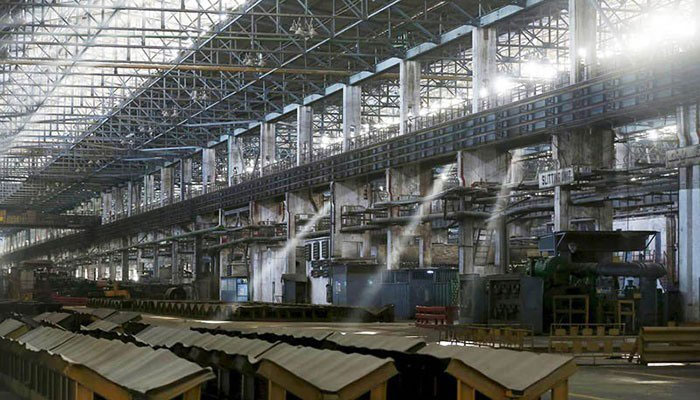CCoP approves PSM privatisation structure
ISLAMABAD: The Cabinet Committee on Privatisation on Thursday approved the sale of Pakistan Steel Mills (PSM) core operating assets to the private sector.
On the recommendation of the privatisation committee, the CCoP approved the transaction structure for Pakistan Steel Mills Corporation. The decision was taken during a meeting presided over by Minister for Finance and Revenue Hafeez Shaikh.
“The approved structure for Pakistan Steel Mills will allow for transfer of identified core operating assets into wholly-owned subsidiary of PSMC through scheme of arrangement as provided in the Companies Act 2017 followed by sale of majority shares of the newly formed subsidiary, without transferring full ownership to strategic private sector partner,” finance ministry said in a statement. Minister for Industries and Production Hammad Azhar, Minister for Maritime Affairs Ali Haider Zaidi, Special Assistant to Prime Minister on Petroleum Nadeem Babar, Minister for Privatisation Mohammadmian Soomro, Adviser to the PM on Commerce Razak Dawood, Minister for Energy Omar Ayub, Special Assistant to Prime Minister on Power Tabish Gauhar and other senior officials participated in the meeting.
The government decided to privatise PSM to ease pressure on fiscal account. A number of state-owned enterprises couldn’t give profits to the national treasury and every government tried to shed such assets to earn one-time revenue and save recurring expenditures. However, privatisation has been a hard nut to crack for every government due to political backlash. PSEs are used as rewarding platform to appease political opponents and retain public mandate. The present administration that has a small political stake in the system took an unpopular decision related to cost attrition.
Since the fiscal deficit is a perennial problem for Pakistan’s struggling economy, structural reforms warrant reduction of expenditures. With limited options, fiscal managers usually cut development spending. The privatisation decisions that are currently seen taken in haste are to cajole International Monetary Fund to revive the stalled $6 billion loan program for Pakistan.
The government has been weighing the option to rejuvenate the PSM under the public-private partnership mode in phases that was estimated to cost around $800 million. The plant would be revived to achieve its built-in capacity in the first phase within one and a half-year, while the production capacity would be jacked up to three million tons in the second phase.
The PSM shut down its furnaces in 2015 and it consumed at least Rs200 billion of state funds on various heads from 2008 when it used to be a profitable organisation. The government had to pump an estimated Rs400 million every year to pay salaries of the PSM’s employees.
-
 King Charles Holds Emergency Meeting After Andrew Arrest: 'Abdication Is Not Happening'
King Charles Holds Emergency Meeting After Andrew Arrest: 'Abdication Is Not Happening' -
 Amazon Can Be Sued Over Sodium Nitrite Suicide Cases, US Court Rules
Amazon Can Be Sued Over Sodium Nitrite Suicide Cases, US Court Rules -
 'Vikings' Star Mourns Eric Dane's Death
'Vikings' Star Mourns Eric Dane's Death -
 Patrick Dempsey Reveals Eric Dane's Condition In Final Days Before Death
Patrick Dempsey Reveals Eric Dane's Condition In Final Days Before Death -
 'Heartbroken' Nina Dobrev Mourns Death Of Eric Dane: 'He'll Be Deeply Missed'
'Heartbroken' Nina Dobrev Mourns Death Of Eric Dane: 'He'll Be Deeply Missed' -
 Andrew Mountbatten-Windsor’s Arrest: What Happened When A Royal Was Last Tried?
Andrew Mountbatten-Windsor’s Arrest: What Happened When A Royal Was Last Tried? -
 Alyssa Milano Expresses Grief Over Death Of 'Charmed' Co-star Eric Dane
Alyssa Milano Expresses Grief Over Death Of 'Charmed' Co-star Eric Dane -
 Prince William, Kate Middleton Camp Reacts To Meghan's Friend Remarks On Harry 'secret Olive Branch'
Prince William, Kate Middleton Camp Reacts To Meghan's Friend Remarks On Harry 'secret Olive Branch' -
 Daniel Radcliffe Opens Up About 'The Wizard Of Oz' Offer
Daniel Radcliffe Opens Up About 'The Wizard Of Oz' Offer -
 Channing Tatum Reacts To UK's Action Against Andrew Mountbatten-Windsor
Channing Tatum Reacts To UK's Action Against Andrew Mountbatten-Windsor -
 Brooke Candy Announces Divorce From Kyle England After Seven Years Of Marriage
Brooke Candy Announces Divorce From Kyle England After Seven Years Of Marriage -
 Piers Morgan Makes Meaningful Plea To King Charles After Andrew Arrest
Piers Morgan Makes Meaningful Plea To King Charles After Andrew Arrest -
 Sir Elton John Details Struggle With Loss Of Vision: 'I Can't See'
Sir Elton John Details Struggle With Loss Of Vision: 'I Can't See' -
 Epstein Estate To Pay $35M To Victims In Major Class Action Settlement
Epstein Estate To Pay $35M To Victims In Major Class Action Settlement -
 Virginia Giuffre’s Brother Speaks Directly To King Charles In An Emotional Message About Andrew
Virginia Giuffre’s Brother Speaks Directly To King Charles In An Emotional Message About Andrew -
 Reddit Tests AI-powered Shopping Results In Search
Reddit Tests AI-powered Shopping Results In Search




